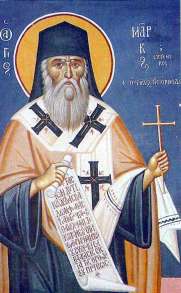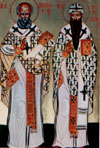Ecumenism Awareness: Monophysites (Non-Chalcedonians)
|
Sts. Athanasius and Cyril of Alexandria |
Monophysites, or Non-Chalcedonians—Armenians, Copts and Ethiopians (Abyssinians), and Syrian and Malabarese Jacobites—have, since the conclusion of the Fourth Oecumenical Synod, been viewed by the Orthodox Church as heretical groups [1]. That is, until this century due to the influence of ecumenism. This page is offered as a corrective.
Despite all the "scholarly discussion" trying to show that we are in fact "of the same Faith and Family as the Monophysites," the fact remains that these groups have not unreservedly accepted the Fourth through Seventh Oecumenical Synods (something which was required of them by the Orthodox participants in all prior reunion attempts throughout church history), nor have they decisively and conclusively renounced the teachings of Dioscoros, Severos, Eutyches, et. al. When those events occur (at the very least), union is imminent.
A Note to Coptic Christians: I fairly regularly receive emails expressing your frustation with being labeled as monophysite on this Web site. You are especially troubled by the article listed below entitled "Copts and Orthodoxy". You claim that you are "miaphysite", not monophysite. Your Christology is therefore supposedly Orthodox even though you do not accept the formulation agreed upon at the Council of Chalcedon (i.e., the Fourth Oecumenical Synod). In other words, "it is supposedly evident that nothing separates us in Faith, that the differences hitherto observed are due to a misunderstanding and misinterpretation of the theological terminology, which the special theological experts now understand better than the holy Fathers, and that the original separation of the Non-Chalcedonians from the Church was due not to theological but to political reasons." [2] Thus you frequently demand that I remove these claims from my site.
To this I can only respond that, from the traditional perspective of the Orthodox Church, you are monophysite. This is how the Orthodox Church has always viewed the Coptic Church. In other words, to us your "miaphysitism" is essentially "monophysitism". Moreover, you have been wrongly led to believe—whether by your own teachers or by Orthodox ecumenists [3]—that the Orthodox Church has been mistaken, and that there's no reason for Coptic Christians to leave their church and be reconciled with Orthodox. Some Orthodox clergy and teachers will agree with you, but I am persuaded by the Saints and teachers whose writings are listed below. I believe they represent the true teaching of the Orthodox Church. Thus, it would seem we are at an impasse regarding your request.
I hasten to remind you, however, what the "Copts and Orthodoxy" article states in all sincerity: "We deeply respect and admire Coptic piety. Many Copts far exceed Orthodox in their dedication to God and fidelity to their faith. But our respect must not impede us from telling them the truth, bringing them into the Church properly, and offering them bread, rather than the stone of cheap ecumenical politics." Dear Coptic Christians, you are very close to us! Unity is a desirable thing! But such unity can only come about with your full acceptance of all seven Oecumenical Synods.
Are you really willing to come to terms with the traditional position of the Orthodox Church? If so, you should read Father John McGuckin's masterful study St. Cyril of Alexandria: The Christological Controversy : Its History, Theology, and Texts. As Daniel Larison noted in his blog:
The most significant consequence of Fr. McGuckin's book, from the perspective of the Orthodox Church and all Chalcedonian Christians, is that it should demonstrate once and for all in a convincing and largely non-polemical way that the post-451 extreme Cyrilline (i.e., monophysite) reading of Cyril and reaction against Chalcedon were theologically misguided and wrong on their own Cyrilline terms. As much as some modern Orthodox and other scholars attempt to sidestep or massage this truth, either with recourse to excusing error on the grounds of confused terminology or by catering to anti-Chalcedonian sentiments with the use of euphemistic names such as Oriental Orthodox or 'miaphysite' rather than monophysite, it seems inescapable that to reject Chalcedon is to turn against the true meaning of Cyril's Christology and no amount of monophysites' invoking Cyril or repeating his sayings formulaically is going to change that.
This need not be taken principally as ridicule or as an attack, but as a call to all those who honour the memory and theology of St. Cyril to recognise his true meaning and grant that Chalcedon is not only compatible with Cyrilline confession but, in a sense, necessary for the defense of St. Cyril's doctrine. Accepting Chalcedon and the Councils that affirm its decrees does honour to St. Cyril, and persisting in schism out of a misunderstanding of his teachings is senseless. Perhaps by elucidating the matter clearly and plainly, Fr. McGuckin's study will help facilitate an understanding of the imperative for the non-Chalcedonian churches to return to Orthodoxy, if perhaps for no other reason than their commitment to the tradition of St. Cyril.
Please do not place your trust in the writings of "Orthodox" ecumenists, whose views will only confirm you in your errors. Find out for yourself what the Orthodox position truly is. And if you personally hold a Chalcedonian Christology, leave the Coptic Church—which has been in heresy and separated from the one, true Church of Christ for over 1500 years—and bring your beliefs to fulfillment by being united to Christ, in the Church which has always believed and professed rightly concerning Him. Forgive my bluntness, but I am only trying to speak the truth in love, for "...[h]e who speaks the truth has love, even if he causes distress at the outset and creates a reaction, not he who misleads and conceals the truth, taking account of temporary human relations and not of eternal realities." [4] —Patrick Barnes
Endnotes
-
Although many persons, at least in the aftermath of the Fourth Oecumenical Synod, were received into the Church as schismatics.
-
"St. John of Damascus and the 'Orthodoxy' of the Non-Chalcedonians": by Protopresbyter Theodore Zisis. This is one of the most important articles on this topic.
-
"In reality there is not a Father and Saint of the Church throughout the age-long Tradition of the fifteen centuries, from the Fourth Oecumenical Synod until today, who would believe and teach that we do not have differences in faith with the Non-Chalcedonians and that they are essentially Orthodox as we are.... [T]he preparation of the members of the Orthodox delegation [involved in ecumenical dialogue with non-Chalcedonians] was not corporate and systematic, based on the sources of the Orthodox Faith, the texts of the Synods and Fathers, but personal, according to the theological preferences and proclivities of each member, based primarily on the contemporary bibliography that has been adulterated by the ecumenist spirit." (Ibid, pp. 3, 5.)
-
Ibid, p. 2.
http://orthodoxinfo.com/ecumenism/ea_mono.aspx


